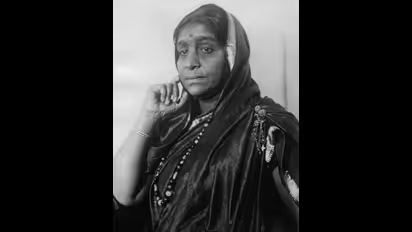Sarojini Naidu death anniversary: Remembering first woman governor of independent India

Synopsis
Sarojini Naidu was the first woman governor of an independent Indian state and the first women president of the Indian National Congress.
Amongst the notable names of freedom fighters in India, a distinct personality that tops the list is Sarojini Naidu. Sarojini Naidu has the honour of being the first woman governor in independent India.
On March 2, 1949, Sarojini Naidu passed away of a heart attack. On her death anniversary, the nation remembers its proudly known "Bharat Nightingale".
Sarojini Naidu was highly inspired by Mahatma Gandhi and entered the freedom fights against the British. In 1914, she first met Gandhi in London. While in South Africa, Naidu supported Gandhi.
Meanwhile, Gopalkrishna Gokhale had a distinct place in Naidu's life. She valued him and considered him as her 'political father'. From 1915 to 1918, Sarojini Naidu and Annie Besant visited India to instil national spirit among the youth.
Alongside Gandhi, Sarojini Naidu actively participated in various movements. While in Quit India Movement, Naidu was also imprisoned.
In the 1925 Kanpur session, Naidu became the first women president of the Indian National Congress. In 1947, Sarojini Naidu was named Governor of the United Provinces (now Uttar Pradesh). She was the first woman governor of an independent Indian state. From August 15, 1947, to March 2, 1949, she was the Governor of Uttar Pradesh.
Naidu was well-versed in many languages, including English, Bengali, Urdu, Telugu, and Persian. At 13, she authored The Lady of the Lake, a 1300-line poem. In Persian, she composed a drama named Mehr Munir. Her books include The Bird of Time, The Broken Wing, Nilambuj, and Traveler's Song. Naidu's native language was Bengali, and she used to pen in the same. Her father, Aghornath Chattopadhyay, was a well-known scientist and educator. At the age of 14, Naidu read all of the English poets. Impressed by her, the Nizam of Hyderabad in 1895 sent her to England on a stipend.
While studying, she actively participated in the national movement. The world's great leaders, including Mahatma Gandhi and Jawaharlal Nehru, were convinced by her leadership abilities. Sarojini Naidu campaigned hard for women's education and a dignified role in society.
In 1905, when Bengal was partitioned, she re-entered in politics. Actively protest and join the national struggle. When the plague struck the country in 1928, she worked tirelessly, taking care of the affected. Understanding her efforts, the British government awarded the title Kaiser-e-Hind to Sarojini Naidu. At the age of 70, she died due to a heart attack.
Also Read: Sarojini Naidu death anniversary: Must-know facts about Bharat Kokila
Also Read: Independence Day 2020: A Few Forgotten Women Freedom Fighters of India
Also Read: Must-see photos of The Nightingale of India Sarojini Naidu
Stay updated with the Breaking News Today and Latest News from across India and around the world. Get real-time updates, in-depth analysis, and comprehensive coverage of India News, World News, Indian Defence News, Kerala News, and Karnataka News. From politics to current affairs, follow every major story as it unfolds. Get real-time updates from IMD on major cities weather forecasts, including Rain alerts, Cyclone warnings, and temperature trends. Download the Asianet News Official App from the Android Play Store and iPhone App Store for accurate and timely news updates anytime, anywhere.